Death Note 2: The Last Name
Introduction
Ooh, more Death Note! Well it's only right and proper that I review the films back to back, considering they were filmed that way. Given my Death Note overload, indulging in the manga and anime released over the last twelve months, you'd think that it might be a predictable and disappointing retread, but the first Death Note live action feature threw up a couple of surprises, and shifted the story in an unexpected direction, and this sequel should continue headlong into unexplored territory. I should hope so too, as it turns out to be my late night film pick for Halloween night, and some suspense, chills and unexpected surprises would go down a treat.
Recapping, a Shinigami (Death God) named Ryuk got bored in the other realm, and decided to drop his Death Note in the human realm to have some fun with whoever would pick it up. That would be Light Yagami, a promising young law student who saw a sickness in society, and leapt at the opportunity to clean house that the Death Note provided. Write someone's name in the Death Note, and that person will die, and do so in the manner specified by the writer. Pretty soon, all manner of criminals were dropping dead, and Light was on his way to his perfect world. Except that the authorities look down on murder, no matter whom the victim, and soon Light was the target of a major police investigation, led by none other than his father Souichiro. And when Light's method proved too baffling, the master detective, and utter eccentric L was called in, and a game of wits between the two young men intensified. At the end of the previous film, Light, distraught at the loss of his girlfriend at the hands of a deranged FBI agent's widow, was co-opted into the Kira investigation by L. At the same time, starlet and idol Misa Amane picks up an odd looking notebook, just after her murderous stalker apparently drops dead of a heart attack.
Light was probably thinking that it would just be a matter of time before he'd get L's true identity and emerge victorious from their battle of wits, but he wasn't expecting a second Kira to appear. Kira II wants to meet Kira, and sees nothing wrong with holding a television station hostage, and killing random policemen to do it. But Misa Amane is in love with Kira, is eternally grateful for the man who meted out justice to the murderer of her family, where the police and the courts failed. Misa has also made the trade for the Shinigami Eyes, swapping half her remaining life for the ability to know someone's identity just by looking at them. When Light shows up at the television station, she quickly recognises him for who he truly is, and later she shows up at his house, bearing a notebook, and accompanied by her Shinigami Rem. Soon the two are concocting a plan to rid the world of L, but Misa isn't as meticulous and careful as Light, and has left an evidence trail. Before they can act against L, Misa is arrested, and Light is taken into custody too, implicated by association. But there is an interesting clause in the rules of the Death Note, that by relinquishing ownership, the owner will lose all memory of it, and of any murders committed using it. Suddenly, the Death Note lands in the lap of disgruntled television researcher Kiyomi Takada, and the killings resume…
The Discs
Single layer DVD-Rs. That isn't what you'll get when you walk into the shop, but it is what I get to review. With over 2 hours of film, plus trailers compressed onto a single disc, there's little point in me commenting on the audio-visual quality, and the screencaps certainly aren't representative of the retail release. I still got the 1.85:1 anamorphic transfer though (native film-PAL), along with the DD 2.0 and 5.1 Japanese soundtracks, with optional English subtitles. Going by the first film, it should be of similar high quality.
I did find one nit to pick though, with a poorly translated subtitle. At one point in the film, the Shinigami Rem threatens to kill Light, at least in Japanese. The subtitle translation is 'I'll send you to Hell!' Perfectly fine in any other context, but a Shinigami has to know that any human owner of a Death Note is barred from heaven or hell. It's explained clearly in the first movie, and again in this one, and it's the sort of error that can throw your suspension of disbelief.
Extras
Buyers of the retail version will probably get the Death Note packaging similar to the first film, with a 24 page making of booklet built into the case. I just got the DVD-Rs, albeit direct copies of the retail discs.
Disc 1 has the animated menus, as well as trailers for the Death Note anime, the first film, Yo Yo Girl Cop, Black Kiss, Starfish Hotel, X-Cross, as well as the theatrical trailer for this film.
Disc 2 holds the rest of the extras, and they follow the same format as for the first film, beginning with the Making Of Documentary, which at 50 minutes covers nigh on identical ground to the piece on the first film. It's a behind the scenes peek at the making of the movie, 8 weeks from June to July 2006 that follow the filming. There are interviews with the cast and crew, behind the scenes footage and scenes from the film. This time however, there is less of a focus on Tatsuya Fujiwara (Light), and more an overall look at the film.
The Video Production Diary lasts 7 minutes, and shows little snippets of the making of the film that the documentary left out.
Tokyo Forum Premiere does just what it says for 3 minutes. The cast present the film to an eager audience for the first time.
Press Conference lasts 3 minutes as well, and is much of the same thing as the premiere footage, but there are more shenanigans between the two leading actors.
Promotion for the film comes in the form of the theatrical trailer, the teaser, and three TV spots.
Finally there is a 40 second slideshow image gallery.
Conclusion
Shot back-to-back with its prequel, Death Note 1 and 2 really comprise two halves of one story, and as such, this review is very much a follow-on to my previous one, and much of what I said about that film could be applied here. It's just as gripping, interesting and entertaining a film, with the mind games that develop between L and Light at the heart of the story. And once more, I found the live-action adaptation to be much stronger than the original manga, or the anime. For one thing, the film maintains the conflict between L and Light as the central motivation, whereas the manga and anime introduced new characters that had one-tenth the charm. Also the characters are richer, better developed, far more human and easier to relate to. It also makes certain that the message of the film, that of absolute power corrupting absolutely, isn't lost behind the convoluted plot developments and mind games.
It isn't a radical departure from the original storyline as I thought, or as the end of the first film intimated, rather the film takes the characters on a fundamentally different journey that oscillates around the original storyline, so familiar scenes and moments crop up, albeit at different points, or with different meanings and emphasis. Misa for instance, uses Sakura TV to announce herself just as before, but there's no ambiguity about her identity as a discrete second Kira, her slaughter of random policemen is much more brutal and callous, framed as it is against the slaughter of her own family in flashback. That viciousness is made clear as Light's sister Sayu happens to be at the scene, and she knows one of the men killed as one of her father's colleagues.
A bit more of a departure is the Sakura TV subplot which develops, and initially it seems a little out of the blue, as we meet a put upon researcher, a lecherous and venal producer in love with ratings, and a diva of a news presenter, all of whom are looking to profit from the Kira story. It's not immediately apparent why these characters are being developed, which certainly makes things interesting if you have the manga storyline burned into the skin of your brain. The compression of a feature film comes into play once again, as we move quickly from Light and Misa's first meeting straight to their arrests and confinement, although the film is surprisingly less graphic about their incarceration. Here L is definitely the good guy, while his manga and anime counterparts were just as cold-blooded as Light, and made the detention of his prisoners a Guantanamo level experience. The film glosses over the captivity with a series of quick edits and date captions, and Misa and Light are freed far more quickly once their innocence has been established.
The point of the Kiyomi character at Sakura TV becomes clear, as she is the next to don the Kira mantle when the Death Note falls to her. In the original story, it was a major corporation that obtained the Death Note, and the killings that ensued helped push up stock prices and dividends. Once again, Kiyomi is a far more human character whose actions are initially sympathetic and then soon begin to appal. From this point, the film completely diverges from the original storyline to present us something new for an ending, and it's an ending that I find to be wholly superior and satisfying to the original.
The Death Note anime and manga, while entertaining, are stories that I found to be morally ambiguous, and somewhat clinical in their approach to the characters. Not so this film, or its predecessor, which examines the characters from a human standpoint, and they aren't shy of taking a moral stance on what the characters do. However much you like the characters and choose sides, there's no denying that the conclusion of this film is the 'right' one, and the emotional impact that it delivers is far superior to the material that its adapted from. Also something I found eminently satisfying is the sound plot. There are nowhere as many plot holes as in the manga, no excessive circumlocutions of logic that leave plot gaps that you can drive through, no point where you can exclaim that a simple bit of common sense would knock over the narrative house of cards. The film is tight, well written, and leaves no room for complaint.
Death Note, and its sequel Death Note 2: The Last Name, are really just one film split in two, and should be taken as a whole. While the first film is a good set up that adheres closely to the original storyline, the second diverges a good deal more, and the result is something that is far more rewarding than the original property. If you liked Death Note, then these are essential purchases, but even if you haven't encountered Death Note before, then these fantasy thrillers are well worth looking into.
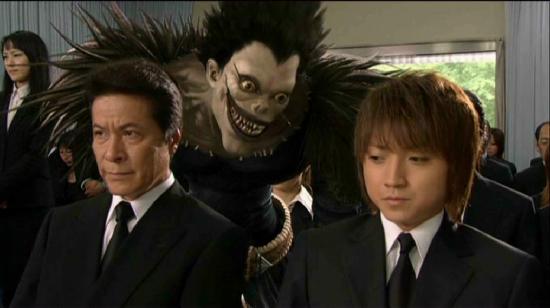

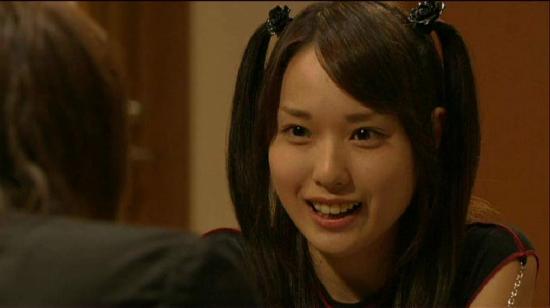
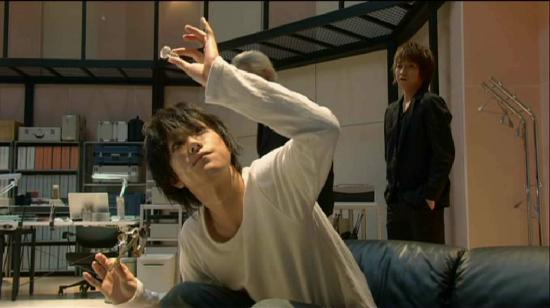
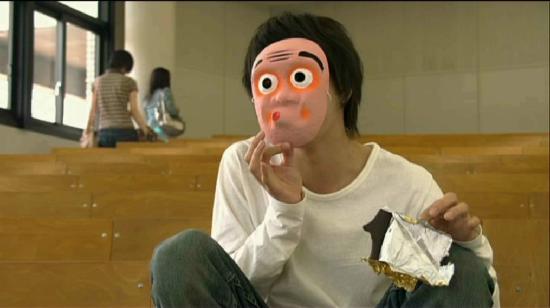
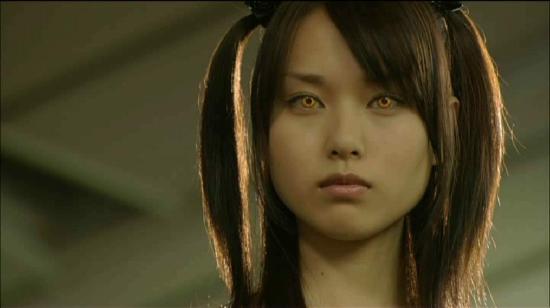
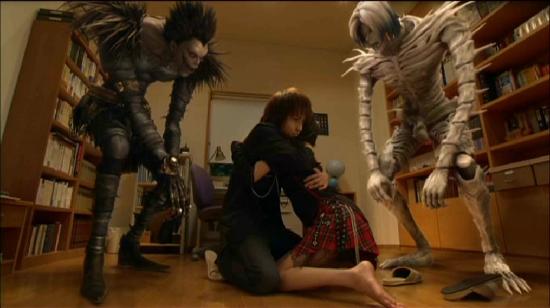
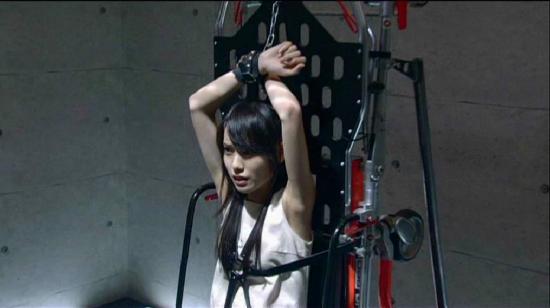

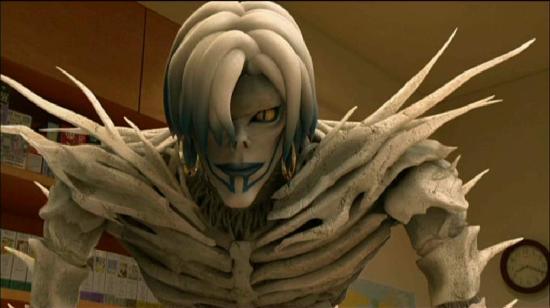
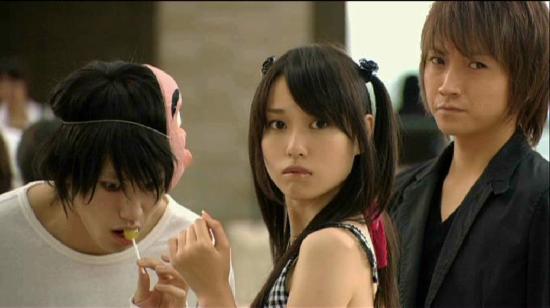
Your Opinions and Comments
Be the first to post a comment!